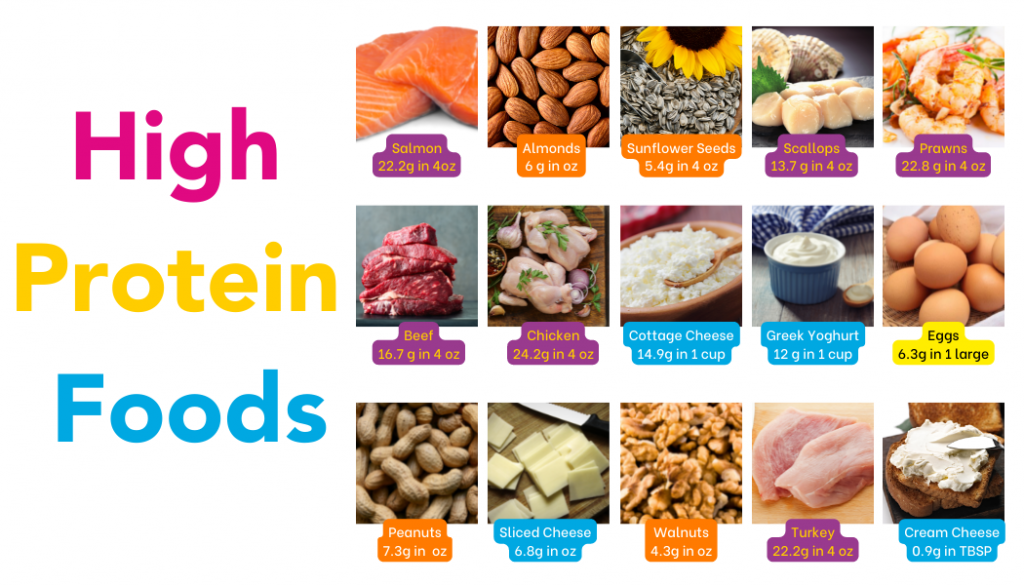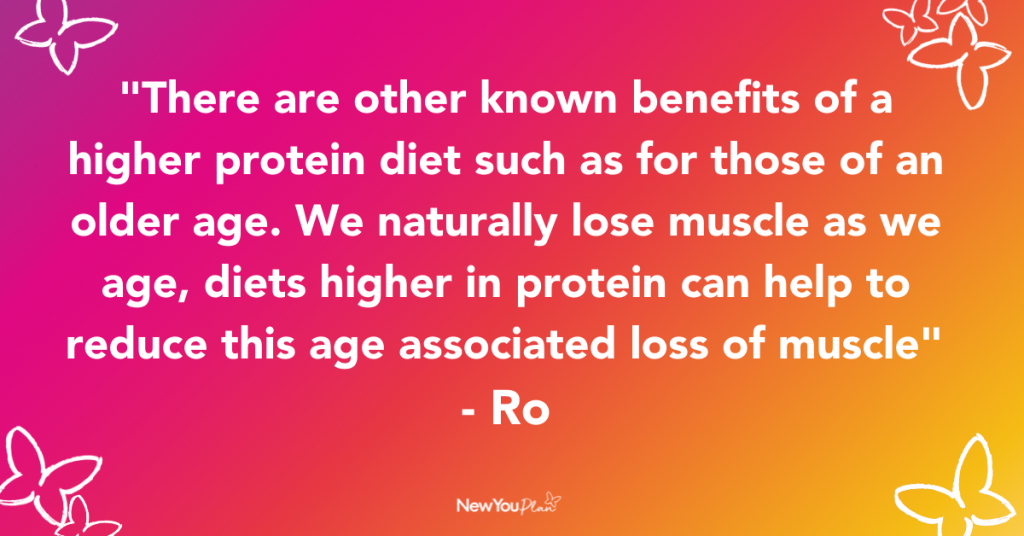What is protein and why is it important?
Protein is one of the three macronutrients found in our diet alongside carbohydrates and fat. It can be used as a source of energy if the body has used up its carbohydrate and fat stores, however a more crucial role is to support the structure, function and regulation of the body.
The idea of eating more protein probably conjures up images of protein shakes, bodybuilders and people who want to bulk out. Protein has an odd reputation.
Of course, if you want to compete to be Mr/Ms Muscles 2022 then upping your protein would be a great start! But even if you’re not, protein is an essential macronutrient that ensures your body works efficiently, as our dietician Ro kindly explains for us below.
Protein is made up of amino acids, which are our body’s building blocks. It is the main component of our muscles, skin, hair and bones and is required for their repair and maintenance. Alongside this amino acids play vital functions in hormone production, cell signalling and communication and allowing essential chemical reactions in our body to take place.
A wide range of foods from meat, fish, eggs and dairy to plant based proteins such as beans/legumes, lentils chickpeas, tofu, nuts, seeds even vegetables contain protein. Consuming a range of different protein sources in our diet allows us to consume all of the essential amino acids our bodies require for essential processes. They are also great sources of a wide variety of vitamins and minerals.

The UK reference nutrient intake (RNI) of protein for adults is 0.75g per kg of body weight per day, for a 60kg woman this translates to 45g/day and for a 70kg man this translates to 52.5g/day. A typical dietary pattern will usually provide you with the recommended amount of protein we require for our bodily functions. If your diet is completely plant-based, combining plant-based sources is important to ensure you gain all of the essential amino acids your body needs as unlike animal proteins, individually plant-based proteins do not contain all of the amino acids we require.
High protein diets and Weight Management
Diets higher in protein than the UK RNIs are often discussed in the context of weight loss and often, the products you find on a diet replacement program are high in protein – so why is this?
- Dietary protein appears to have a larger effect on the hormones that make us feel full compared to carbohydrate and fat meaning that eating more of it can reduce our appetite leading to a reduction in the amount of food eaten (1,2). Thus it can help to reduce hunger and food intake aiding with both weight loss and weight maintenance
- Protein, carbohydrate and fat are all broken down by the body in different ways. It takes a little more energy for us to break down protein than it does for us to break down either fat or carbohydrate (3) therefore it is suggested that diets higher in protein can help with energy balance and weight management.
- High protein diets and specifically high protein total diet replacement diets (4) have been shown to promote fat loss through increased breakdown of fat when compared to diets that are also calories restricted but are less high in protein.
- With the preference for the breakdown of fat on a high protein diet, a calorie controlled higher protein diet can provide weight loss and fat loss benefits whilst protecting against muscle loss improving our body composition (5). Preserving muscle, our fat free mass as opposed to our fat mass, when losing weight is important for our strength and mobility, as well as preserving our metabolic rate which in turn is helpful for weight management.
There are other known benefits of a higher protein diet such as for those of an older age. We naturally lose muscle as we age, diets higher in protein can help to reduce this age-associated loss of muscle (6) and so can be beneficial for those in later years. Additionally, combining higher protein intake with resistance training can help to build muscle mass and strength.

How to incorporate more protein in your diet
Although there are many protein powder and protein supplement products on the market today it is possible to get all of the protein we require from our food. Incorporating more plant-based proteins in your diet, over animal protein can be beneficial for overall health as they are associated with reductions in cardiovascular disease risk and reduce the risk of certain cancers (7).
It has been suggested that consuming 25–30 g of protein per meal can provide improvements in appetite and body weight management (8). It is recommended to distribute protein intake over the course of the day rather than consuming it all in one go (9).
If you are looking to lose weight, specifically formulated higher protein total diet replacement products can be of benefit for weight loss and body composition compared with calorie restriction alone.
It is important to bear in mind however that consuming more protein may not be right for everyone, for example, higher protein intake is not advised for people with moderate to advanced kidney disease. Additionally, eating higher amounts of protein can potentially lead to kidney stones in susceptible people.
Hopefully, you found that really informative and now understand more about the benefits of making sure you have enough protein in your diet.
Protein really is the caring and repairing macronutrient! It helps you feel full and helps your body function smoothly like a well-oiled machine. You can also find it in countless varieties of delicious foods, so what’s not to love?
Check out Ro’s other blogs for help and inspiration on how to eat healthily when you Switch. And don’t forget all the meal ideas from customers over on New You’s Switch Facebook group.
References
1. Weigle DS, Breen PA, Matthys CC, Callahan HS, Meeuws KE, Burden VR, et al. A high-protein diet induces sustained reductions in appetite, ad libitum caloric intake, and body weight despite compensatory changes in diurnal plasma leptin and ghrelin concentrations. Am J Clin Nutr [Internet]. 2005 [cited 2021 Feb 25];82(1):41–8. Available from: https://ift.tt/0AFn6Lp
2. Lejeune MPGM, Westerterp KR, Adam TCM, Luscombe-Marsh ND, Westerterp-Plantenga MS. Ghrelin and glucagon-like peptide 1 concentrations, 24-h satiety, and energy and substrate metabolism during a high-protein diet and measured in a respiration chamber. Am J Clin Nutr [Internet]. 2006 Jan 1 [cited 2021 Feb 25];83(1):89–94. Available from: https://ift.tt/7165xsp
3. Halton TL, Hu FB. The effects of high protein diets on thermogenesis, satiety and weight loss: A critical review. J Am Coll Nutr [Internet]. 2004 Oct 1 [cited 2021 Mar 16];23(5):373–85. Available from: https://ift.tt/oCs1uyO
4. Oliveira CLP, Boulé NG, Sharma AM, Elliott SA, Siervo M, Ghosh S, et al. A high-protein total diet replacement increases energy expenditure and leads to negative fat balance in healthy, normal-weight adults. Am J Clin Nutr [Internet]. 2021 Feb 2 [cited 2021 Mar 16];113(2):476–87. Available from: https://ift.tt/RSn4fyr
5. Wycherley TP, Moran LJ, Clifton PM, Noakes M, Brinkworth GD. Effects of energy-restricted high-protein, low-fat compared with standard-protein, low-fat diets: A meta-analysis of randomized controlled trials. Am J Clin Nutr [Internet]. 2012 Dec 1 [cited 2021 Mar 16];96(6):1281–98. Available from: https://ift.tt/CRWszkN
6. Rafii M, Chapman K, Owens J, Elango R, Campbell WW, Ball RO, et al. Dietary protein requirement of female adults >65 years determined by the indicator amino acid oxidation technique is higher than current recommendations. J Nutr [Internet]. 2015 [cited 2021 Mar 16];145(1):18–24. Available from: https://ift.tt/3ZObCaY
7. Naghshi S, Sadeghi O, Willett WC, Esmaillzadeh A. Dietary intake of total, animal, and plant proteins and risk of all cause, cardiovascular, and cancer mortality: Systematic review and dose-response meta-analysis of prospective cohort studies. BMJ [Internet]. 2020 Jul 22 [cited 2021 Mar 26];370:2412. Available from: https://ift.tt/lF3UAKb
8. Leidy HJ, Clifton PM, Astrup A, Wycherley TP, Westerterp-Plantenga MS, Luscombe-Marsh ND, et al. The role of protein in weight loss and maintenance. Am J Clin Nutr [Internet]. 2015 Jun 1 [cited 2021 Mar 25];101(6):1320S-1329S. Available from: https://ift.tt/3Vvl1hA
9. Layman DK, Anthony TG, Rasmussen BB, Adams SH, Lynch CJ, Brinkworth GD, et al. Defining meal requirements for protein to optimize metabolic roles of amino acids. Am J Clin Nutr [Internet]. 2015 Jun 1 [cited 2021 Mar 16];101(6):1330S-1338S. Available from: https://ift.tt/VQhb8zg

The post PROTEIN appeared first on The New You Plan.
Chantelle Chirimuuta
Comments
Post a Comment